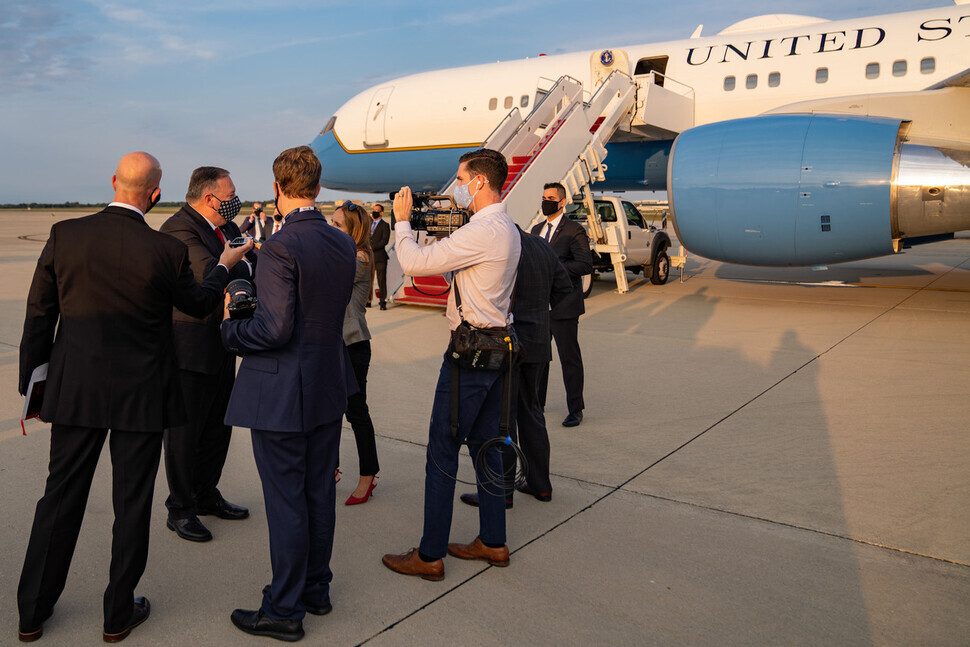hankyoreh
Links to other country sites 다른 나라 사이트 링크
[News analysis] US tones down Quad rhetoric after objections from S. Korea and other Asian countries

The US State Department appears to have tempered its view on the “Quad” framework of regional cooperation for Washington’s “Indo-Pacific Strategy” in East Asia to contain China. The change is seen as the result of objections from South Korea and other major countries in the region.
The idea of the “Quad” -- a security dialogue involving the four countries of the US, Japan, Australia, and India that has been developed under US and Japanese leadership since last year -- suddenly emerged as a focus of global attention in late August after remarks by US Deputy Secretary of State Stephen Beigun at the US-India Strategic Partnership Forum.
“It is a reality that the Indo-Pacific region is actually lacking in strong multilateral structures. They don’t have anything of the fortitude of NATO or the European Union,” Biegun said at the time.
“Starting with the Quad, starting with just the four might be a very important start,” he also said.
But a little over a month later on Oct. 2, Assistant Secretary of State for East Asian and Pacific Affairs David Stilwell defined the Quad as “an informal grouping of like-minded partners formed to deepen cooperation on sub-regional issues and shape a more closely aligned Indo-Pacific region.” He also said that Quad membership “is driven by shared interests, not binding obligations.”
In the space of just a month, the US’ position was moderated from a “first step” toward an exclusive collective security framework along the lines of NATO to an “informal grouping” among countries sharing common interests.
The reason for the US’ more tempered position on the Quad appears to have to do with the outcry that followed in the wake of Biegun’s remarks. A representative example came during a video conference hosted by the Asia Society on Sept. 25, where South Korean Minister of Foreign Affairs Kang Kyung-wha said of the Quad, “I don’t think anything that automatically excludes the interests of other countries [i.e., China] is a good idea.”
Japanese prime minister says China-containment network is “not strategically correct”Japanese Prime Minister Yoshihide Suga, who had been one of the most vocal proponents of the Quad vision, caused some controversy with his remarks during a Sept. 12 roundtable hosted by the Liberal Democratic Party (LDP) leadership. Suga said that an “Asian NATO” framework would “inevitably be a ring around China” and was “not strategically correct.” His remarks reflected his consideration on how to usher China-Japan relations in a friendlier direction even as the US-Japan alliance remains unavoidably the axis of its national security.
In an interview published in the Nikkei on Oct. 3, former US Deputy Secretary of State Richard Armitage said, “No ASEAN country really wants to have to make a choice between the US and China. [US Secretary of State Mike] Pompeo seems to be forcing that choice.” He also advised revising some of the rhetoric that gives the sense of inciting anti-China sentiment. In the US, many analysts have predicted that objections from India, with its long tradition of nonalignment, and from South Korea and the ASEAN countries, which are currently walking a delicate tightrope between the US and China, spell difficulties in upgrading the Quad framework into an exclusive security dialogue to shut China out.
But Washington’s vision of “containing” China through the Quad has not actually changed. Even amid the urgency following the president’s diagnosis with COVID-19, Pompeo told reporters while leaving Washington for a Quad foreign ministers’ meeting scheduled in Tokyo on Oct. 6 that “to meet with our Quad partners is a project we’ve been preparing for.”
“We’re hoping to have some significant announcements, significant achievements,” he added.
By Gil Yun-hyung, staff reporter
Please direct comments or questions to [english@hani.co.kr]

Editorial・opinion
![[Editorial] Yoon must halt procurement of SM-3 interceptor missiles [Editorial] Yoon must halt procurement of SM-3 interceptor missiles](https://flexible.img.hani.co.kr/flexible/normal/500/300/imgdb/child/2024/0501/17145495551605_1717145495195344.jpg) [Editorial] Yoon must halt procurement of SM-3 interceptor missiles
[Editorial] Yoon must halt procurement of SM-3 interceptor missiles![[Guest essay] Maybe Korea’s rapid population decline is an opportunity, not a crisis [Guest essay] Maybe Korea’s rapid population decline is an opportunity, not a crisis](https://flexible.img.hani.co.kr/flexible/normal/500/300/imgdb/original/2024/0430/9417144634983596.jpg) [Guest essay] Maybe Korea’s rapid population decline is an opportunity, not a crisis
[Guest essay] Maybe Korea’s rapid population decline is an opportunity, not a crisis- [Column] Can Yoon steer diplomacy with Russia, China back on track?
- [Column] Season 2 of special prosecutor probe may be coming to Korea soon
- [Column] Park Geun-hye déjà vu in Yoon Suk-yeol
- [Editorial] New weight of N. Korea’s nuclear threats makes dialogue all the more urgent
- [Guest essay] The real reason Korea’s new right wants to dub Rhee a founding father
- [Column] ‘Choson’: Is it time we start referring to N. Korea in its own terms?
- [Editorial] Japan’s rewriting of history with Korea has gone too far
- [Column] The president’s questionable capacity for dialogue
Most viewed articles
- 1Months and months of overdue wages are pushing migrant workers in Korea into debt
- 2Trump asks why US would defend Korea, hints at hiking Seoul’s defense cost burden
- 3At heart of West’s handwringing over Chinese ‘overcapacity,’ a battle to lead key future industries
- 4[Editorial] Yoon must halt procurement of SM-3 interceptor missiles
- 5Fruitless Yoon-Lee summit inflames partisan tensions in Korea
- 61 in 3 S. Korean security experts support nuclear armament, CSIS finds
- 7Dermatology, plastic surgery drove record medical tourism to Korea in 2023
- 8AI is catching up with humans at a ‘shocking’ rate
- 9First meeting between Yoon, Lee in 2 years ends without compromise or agreement
- 10Amnesty notes ‘erosion’ of freedom of expression in Korea in annual human rights report